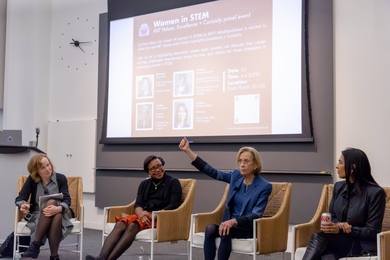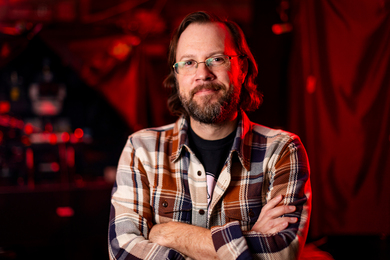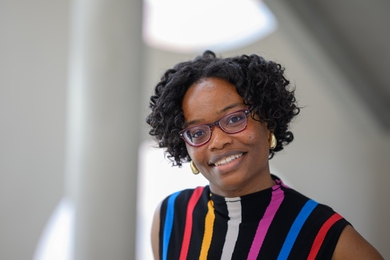Associate Provost for the Arts Alan Brody delights in nurturing and directing MIT's annual production of student-written one-act plays. This time, though, MIT students are turning the tables as they stage a script by Brody himself.
Directed by Senior Lecturer Michael Ouellette, the co-curricular student theater group Dramashop is presenting Brody's play "The Company of Angels" on Feb. 5-7 and Feb. 12-14 at 8 p.m. in Kresge Little Theater.
Inspired by a true story, "The Company of Angels" dramatizes life in a traveling Yiddish theater company as the performers try to reestablish their theatrical tradition in post-World War II Europe. Touring Poland and Germany after the liberation of the Nazi concentration camps in 1945, they perform for displaced persons, hoping to restore in them the joy of living.
Using elements of music, dance and drama, Brody's work is a sprawling epic, with 20 scenes presented by 11 characters in two acts and set in 19 locations in Poland and Germany. It received the 1990 Eisner Award from the Streisand Center for Jewish Culture in Los Angeles and had its world premiere at the New Repertory Theater in Newton in the spring of 1993.
Ouellette, who returned to acting when he participated in the first staged reading of the play at New Rep, suggested staging the work at MIT. "I think, though he's never said it, that Alan has always wanted the play done here," said Ouellette, calling the work a 'college play' for its educational value.
Brody, who added one song for the MIT production, confirmed Ouellette's implication that the show could be a teaching tool for historical and sociological research. "It is doing exactly what it was supposed to do in that way," said Brody.
To prepare for their roles, the student cast members constructed histories of their characters, supplementing the information given in the play with research on the Holocaust and its victims. "We all read a lot, shared our findings and watched several documentaries, the most painful of which was several hours of 'Shoah,' Claude Lanzmann's film about the Holocaust," said Ouellette.
The students then did their own "Shoah" when each one, in character, spoke of his or her life before the play began.
In addition, the Jewish members of the cast have helped educate the non-Jews about the religious and cultural aspects of the play. "The highlight of this education so far was a Shabbat dinner, prepared for everyone by several Jewish members of the cast," said Ouellette.
A valuable MIT resource for the Dramashop production has been Mike Katz, technical director in theater arts, and his wife, Linda Gritz, who have been consultants on the Yiddish that's spoken and sung in the play. "Mike was the Yiddish consultant for the New Rep productions, so it feels especially right and good having him work with us," said Ouellette, adding that the couple's 12-year-old son Ben is also involved in the production, playing several roles "and very well."
When asked if it was intimidating to put on a show written by a fellow faculty member, Ouellette noted that while Brody has always been available for consultation, he waits for invitations to participate. "All of us are somewhat nervous because we want to honor Alan by our work on this production," said Ouellette. "Everyone reveres Alan and is doing the project as an homage to him."
"It's especially meaningful for me to have this play done here at MIT because I know so many of the students involved in the production as a teacher, director, advisor," said Brody. "I'm thrilled at the idea of being their playwright, too. And one who is still alive as well!"
Tickets are $8 ($6 for students) and are available in Lobby 10 or at the door. For reservations or more information, call 253-2908, e-mail ds_officers@mit.edu or see http://web.mit.edu/dramashop/www.
A version of this article appeared in MIT Tech Talk on February 4, 2004.






